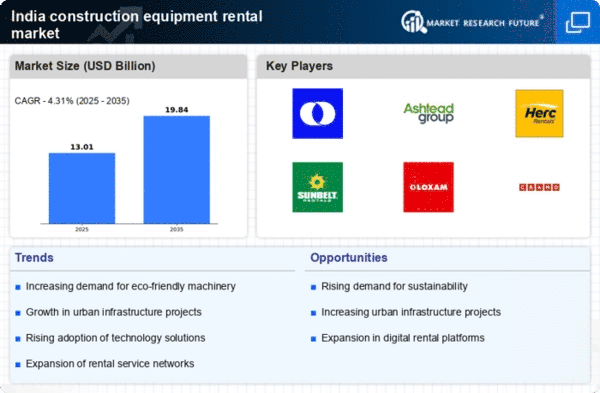Technological Advancements in Equipment
Technological advancements in construction equipment are transforming the rental landscape in India. Innovations such as telematics, automation, and advanced machinery are enhancing operational efficiency and safety on construction sites. The integration of smart technologies allows rental companies to monitor equipment usage, optimize maintenance schedules, and reduce downtime. As a result, construction firms are increasingly inclined to rent technologically advanced equipment to stay competitive. The construction equipment rental market is likely to expand. Companies seek to leverage these advancements without incurring the high costs of ownership. Furthermore, the growing emphasis on productivity and efficiency in construction projects aligns with the capabilities offered by modern rental equipment, indicating a positive trajectory for the market.
Cost Efficiency and Financial Flexibility
Cost efficiency remains a pivotal driver for the construction equipment-rental market in India. Many construction firms face budget constraints and fluctuating project demands, making rental solutions an attractive option. Renting equipment allows companies to avoid the substantial upfront costs associated with purchasing machinery, thereby freeing up capital for other operational needs. Additionally, rental agreements often include maintenance and support services, further reducing the financial burden on contractors. According to industry estimates, renting can save companies up to 30% compared to ownership costs. This financial flexibility enables construction firms to allocate resources more effectively, enhancing their competitiveness in a rapidly evolving market. As cost considerations continue to influence decision-making, the construction equipment-rental market is expected to thrive.
Government Initiatives and Policy Support
Government initiatives aimed at boosting infrastructure development play a crucial role in shaping the construction equipment-rental market. Programs such as the National Infrastructure Pipeline (NIP) aim to invest over $1.4 trillion in infrastructure projects by 2025. This ambitious plan is likely to create a surge in demand for construction equipment, as contractors seek to meet project deadlines and quality standards. Additionally, policies promoting public-private partnerships (PPPs) encourage private sector participation in infrastructure projects, further driving the need for rental services. The construction equipment-rental market stands to gain from these initiatives, as companies may prefer renting equipment to minimize financial risks associated with large-scale investments. The alignment of government policies with market needs suggests a favorable environment for the growth of the construction equipment-rental market in India.
Urbanization and Infrastructure Development
The rapid urbanization in India is a primary driver for the construction equipment-rental market. As cities expand, the demand for infrastructure development, including roads, bridges, and residential complexes, increases significantly. According to government data, urban areas are expected to house 600 million people by 2031, necessitating substantial construction activities. This surge in urban population leads to a heightened need for construction equipment, which rental services can fulfill efficiently. The construction equipment rental market benefits from this trend. Companies prefer renting over purchasing to manage costs effectively. The flexibility of rental agreements allows construction firms to scale their operations according to project requirements, thereby enhancing productivity and reducing capital expenditure. Consequently, the construction equipment-rental market is poised for growth as urbanization continues to drive infrastructure projects across the country.
Environmental Regulations and Sustainability Trends
The increasing focus on environmental regulations and sustainability is shaping the construction equipment-rental market in India. Stricter regulations regarding emissions and waste management compel construction companies to adopt eco-friendly practices. Rental services that offer sustainable equipment options, such as electric or hybrid machinery, are becoming more appealing to contractors aiming to comply with these regulations. The construction equipment rental market is likely to benefit from this trend. Companies seek to minimize their environmental footprint while maintaining operational efficiency. Furthermore, the growing awareness of sustainability among consumers and stakeholders encourages construction firms to prioritize eco-friendly solutions. This shift towards sustainability not only aligns with regulatory requirements but also enhances the reputation of companies in the construction sector, indicating a promising future for the rental market.
















